Introduction
In the complex and dynamic landscape of modern business, the Chief Financial Officer (CFO) stands as a pivotal figure in steering organizations towards financial stability and growth. This article delves into the multifaceted role of a CFO, exploring how they craft and execute robust financial strategies that align with overarching company goals. From meticulous financial reporting and proactive risk management to leveraging data-driven insights for executive decision-making, a CFO’s responsibilities are extensive and critical.
Real-world examples demonstrate the transformative impact a skilled CFO can have, especially in startups and evolving businesses, highlighting the importance of strategic foresight and financial leadership. Furthermore, the article discusses the benefits of outsourcing CFO services, detailing how this approach can provide specialized expertise and advanced financial tools without the cost of a full-time executive. By examining key areas where CFO advisory services add value, the role of technology and automation in financial management, and case studies of businesses transformed by professional CFO services, this comprehensive exploration underscores the indispensable role of the CFO in achieving sustainable business success.
Understanding the Role of a CFO in Business
The CFO is crucial in steering an organization towards economic stability and growth. By developing and implementing a strong monetary plan, the CFO ensures that all fiscal activities align with the company’s overarching objectives. This includes meticulous monetary reporting, proactive risk management, and stringent compliance with regulatory standards. In addition to these responsibilities, the CFO leverages data-driven insights to steer executive decisions, fostering a culture of informed and strategic planning.
Statistics reveal that the average tenure for CFOs in the Fortune 500 is 4.5 years, highlighting the dynamic nature of this role. 'Additionally, a study by the Small Business Administration highlights the significance of monetary planning, mentioning that only fifty percent of new ventures endure their initial five years mainly because of inadequate fiscal management. A skilled CFO can reduce such risks by creating precise monetary forecasts, overseeing cash flow, and devising funding strategies customized to the organization's needs.
Real-world examples illustrate the transformative impact of a CFO. For instance, bringing on a Growth CFO, even part-time during a startup's early stages, can be a game-changer. They can identify growth obstacles, such as customer acquisition and capital access, and implement solutions to overcome these challenges. Such strategic foresight and economic leadership not only protect but also enhance business value, ensuring long-term success.
Quotes from industry experts further emphasize this shift in the CFO’s role. 'Embracing an entrepreneurial mindset, a modern CFO transcends traditional monetary stewardship to become a strategic leader, fostering innovation and calculated risk-taking.'. This evolution is crucial as it aligns monetary strategies with the company's broader vision, driving sustainable growth and profitability.
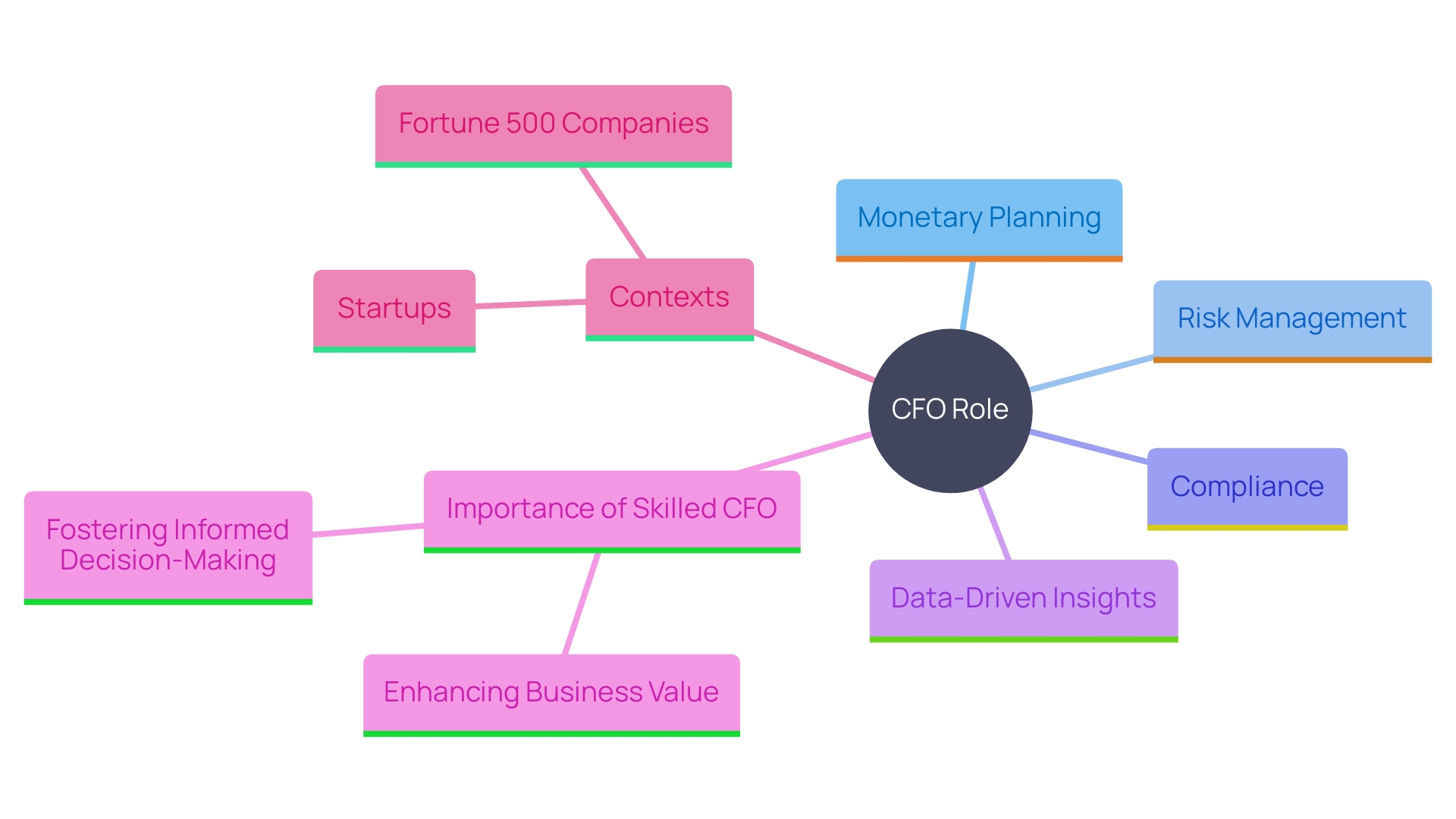
Benefits of Outsourcing CFO Services
Outsourcing CFO services can transform leadership in commerce for businesses, providing a strategic advantage without the expense of a full-time executive. This approach provides access to specialized expertise, advanced monetary tools, and fresh perspectives. By utilizing outsourced CFO services, companies can attain substantial cost reductions and gain flexibility in managing their finances. This enables them to concentrate on essential operations while ensuring their monetary strategies align with best practices.
Recent trends highlight the significance of technology in managing finances. According to a Grant Thornton survey, 66% of finance leaders plan to increase spending on IT and digital transformation, believing this investment will enhance organizational effectiveness and efficiency. Additionally, 8 in 10 CFOs are adopting AI and automation to focus on value-generating tasks, further emphasizing the strategic benefits of outsourced CFO services.
Case studies highlight the advantages of outsourcing. For instance, Strategic CFO®'s NearSourcing™ Accounting Solutions illustrates how aligning monetary services with market-specific requirements can lead to organizational success. By outsourcing, businesses can guarantee adherence to regulations, enhance cost management, and efficiently convey economic plans to stakeholders. This strategic alliance enables enterprises to maneuver through intricate economic environments, making outsourcing an appealing choice for improving monetary leadership.
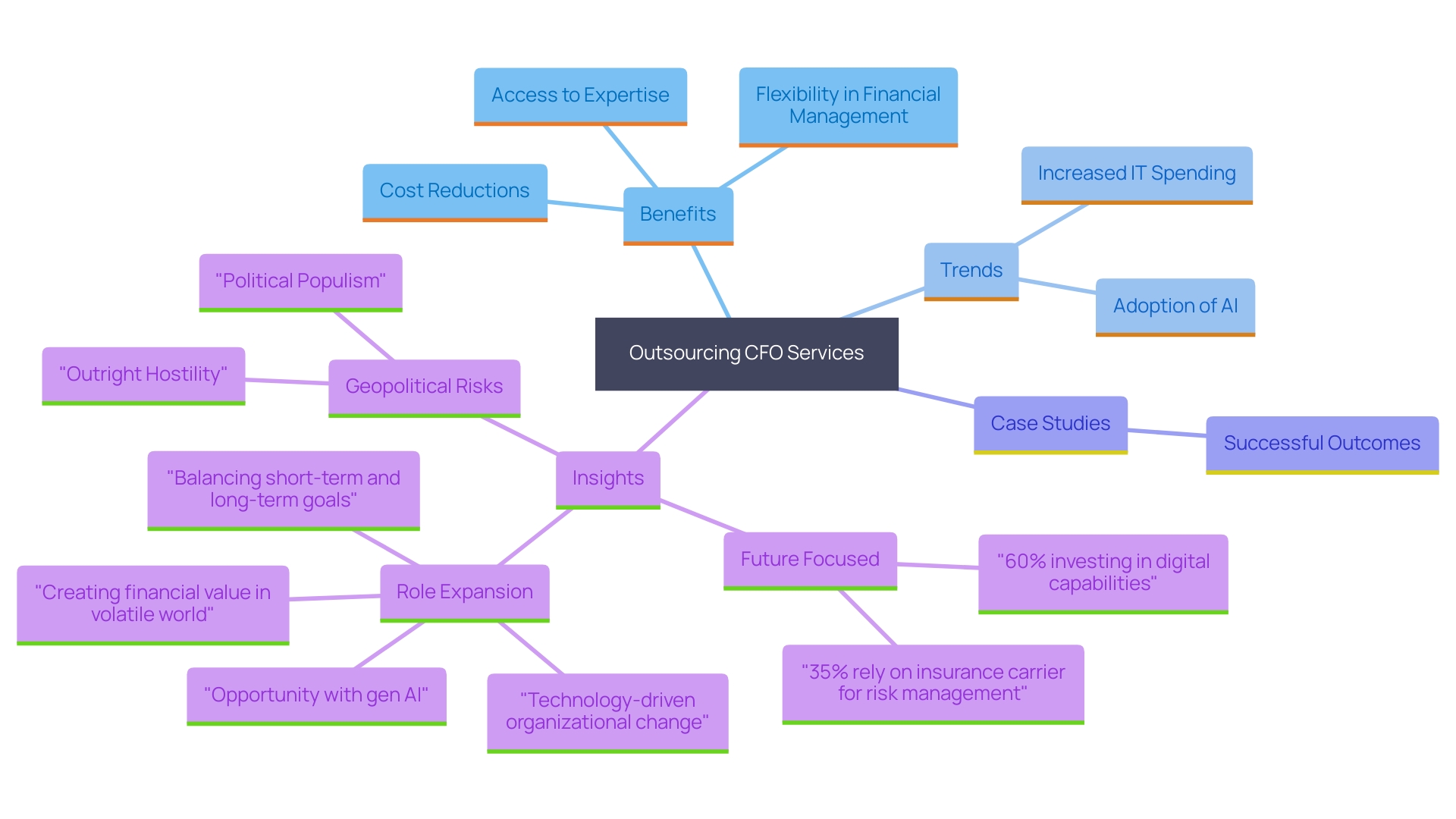
Key Areas Where CFO Advisory Services Can Add Value
CFO advisory services can transform a business's economic health through comprehensive strategies and expert guidance. By leveraging advanced monetary planning and analysis, these services pinpoint growth opportunities and optimize operations. For instance, firms like Crowe LLP and Cornerstone Advisors utilize their deep industry expertise and proprietary data to provide strategic monetary insights that drive sustainable growth.
Additionally, CFO advisors play a critical role in risk management and compliance. They assist companies in navigating intricate economic environments, ensuring precise and prompt reporting and maintaining strong internal controls. Based on a report by the Small Business Administration (SBA), numerous startups do not succeed within the initial five years because of insufficient monetary strategies. CFOs reduce this risk by creating monetary strategies aligned with organizational objectives, providing a solid foundation for long-term success.
Furthermore, CFO advisory services enhance data-driven decision-making. By implementing systems to track and analyze key performance indicators (KPIs), organizations can make informed decisions, optimize operations, and adapt swiftly to market changes. With 60% of companies investing in digital capabilities, the role of predictive analytics becomes even more crucial. It helps estimate future outcomes and improve performance, allowing CFOs to respond effectively in an increasingly complex economic environment.
In summary, CFO advisory services provide invaluable assistance in strategic planning, compliance, risk management, and data-driven decision-making, empowering organizations to achieve sustainable growth and economic stability.
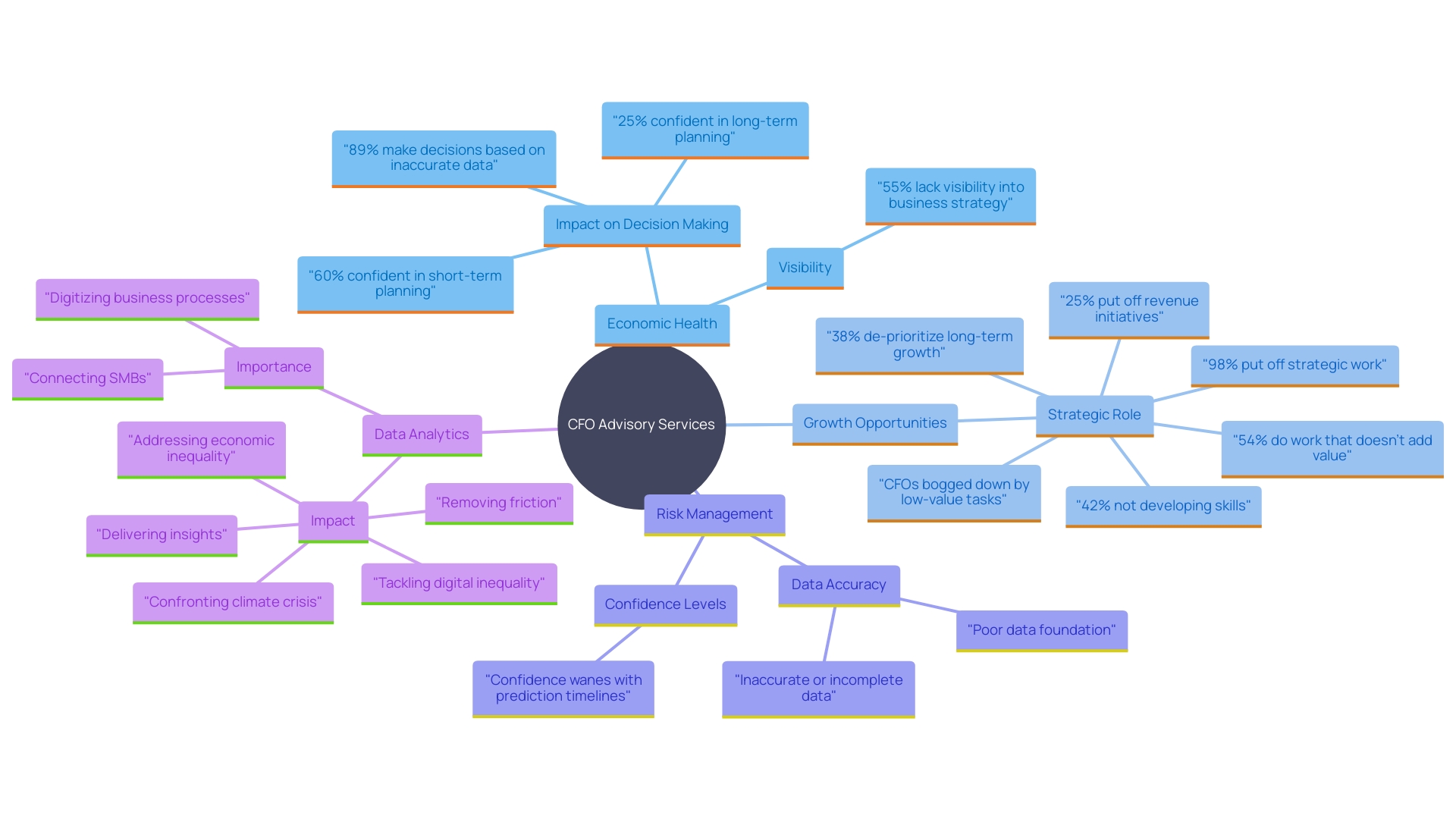
Leveraging Technology and Automation
In today's fast-paced commercial environment, leveraging technology and automation is essential for effective financial management. A substantial share of small and medium-sized enterprises (SMEs) still depend on manual processes, with 42% in sectors such as agriculture, manufacturing, transportation, and professional services utilizing spreadsheets and paper records for cash flow management. This dependence on manual tools results in difficulties in monitoring expenses, revenue, and producing precise forecasts, as indicated by 60% of organizations.
CFO advisory services offer the implementation of advanced financial software and tools that automate reporting, budgeting, and forecasting processes. 'This shift towards automation addresses common issues such as delayed invoicing and payments, which affect 30% of enterprises, and difficulties in managing accounts receivable and payable, impacting 26%.'.
Adopting these technologies not only enhances accuracy and reduces manual errors but also significantly improves productivity and efficiency. According to recent studies, 32% of enterprises invest in new software to boost productivity, 30% for better data management and analysis, and 28% to create operational efficiencies. By freeing up valuable time for finance teams, organizations can concentrate on strategic initiatives that drive growth and long-term financial stability. Automating routine tasks allows organizations to stay flexible, manage risks effectively, and meet their growth targets even amidst uncertainties.
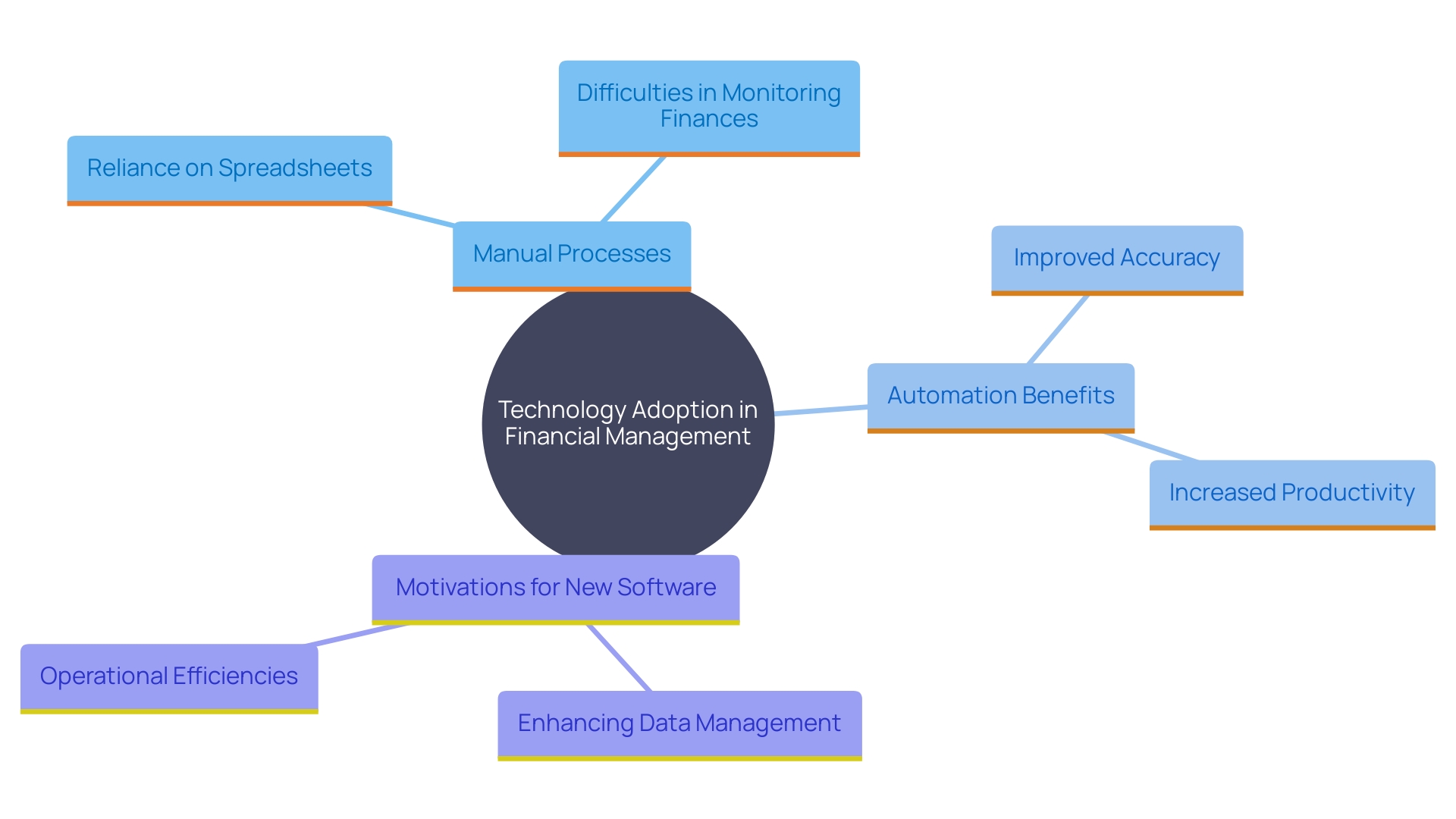
Maximizing the Services of a CFO Consultant
To maximize the value of a CFO consultant, organizations should prioritize robust collaboration and open communication. Setting clear objectives and expectations from the beginning ensures alignment and fosters a productive partnership. Regularly evaluating progress and outcomes is essential to maintaining momentum and making necessary adjustments to strategies. Collaborating with an experienced CFO advisor, such as those from firms like Crowe LLP, can assist organizations in discovering concealed opportunities and fostering significant change. Crowe's deep industry expertise and global reach provide unparalleled insights, enabling organizations to navigate market challenges effectively. By leveraging the strategic guidance of a CFO consultant, companies can enhance their financial leadership, optimize their processes, and achieve sustainable success.
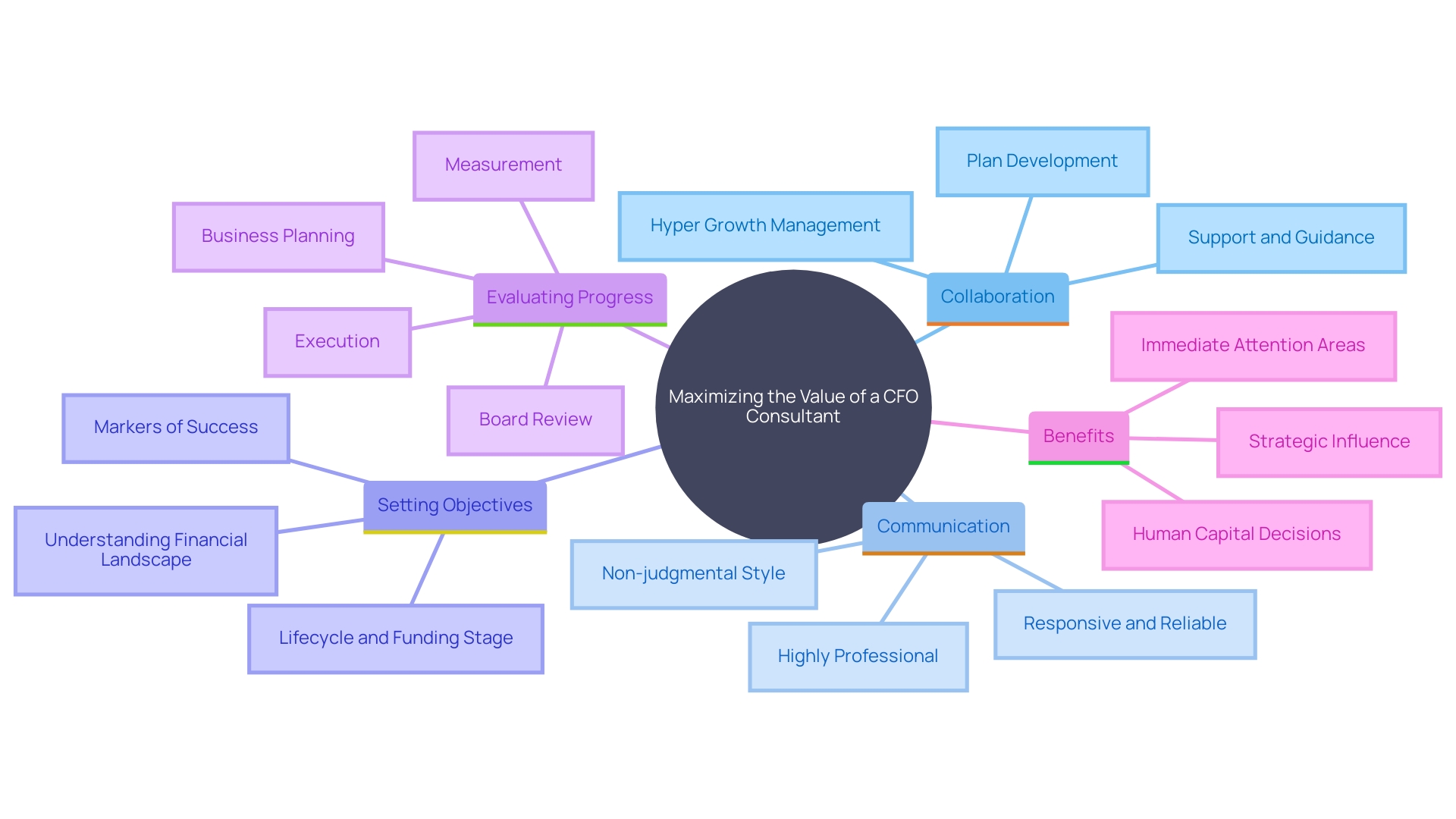
Case Studies: Businesses Transformed by Professional CFO Services
Numerous businesses have experienced transformative results through the engagement of professional CFO services. For example, a mid-sized retail firm utilized CFO advisory to enhance its inventory management and improve pricing approaches, leading to a 20% rise in profit margins within a year. Similarly, a restaurant group utilized CFO consulting to improve cash flow forecasting, leading to more informed investment decisions and sustainable growth.
A notable case is the transformation of a hotel that faced significant operational challenges. The hotel had over 45 rooms out of order, minimal housekeeping staff, and an occupancy rate of just 27% with an Average Daily Rate (ADR) of $67.73. Through strategic monetary leadership, the CFO executed strong economic plans, leading to enhanced room availability and higher occupancy rates.
These success stories highlight the tangible benefits of strategic monetary leadership. As Dayna Quanbeck, CFO and president of Rothy’s, notes, “CFOs are not just defensive, record-keeping, news-reporting individuals — now they're actually informing and driving strategy, capital allocation, and risk assessment.” This shift underscores the critical role CFOs play in steering companies towards financial stability and growth.
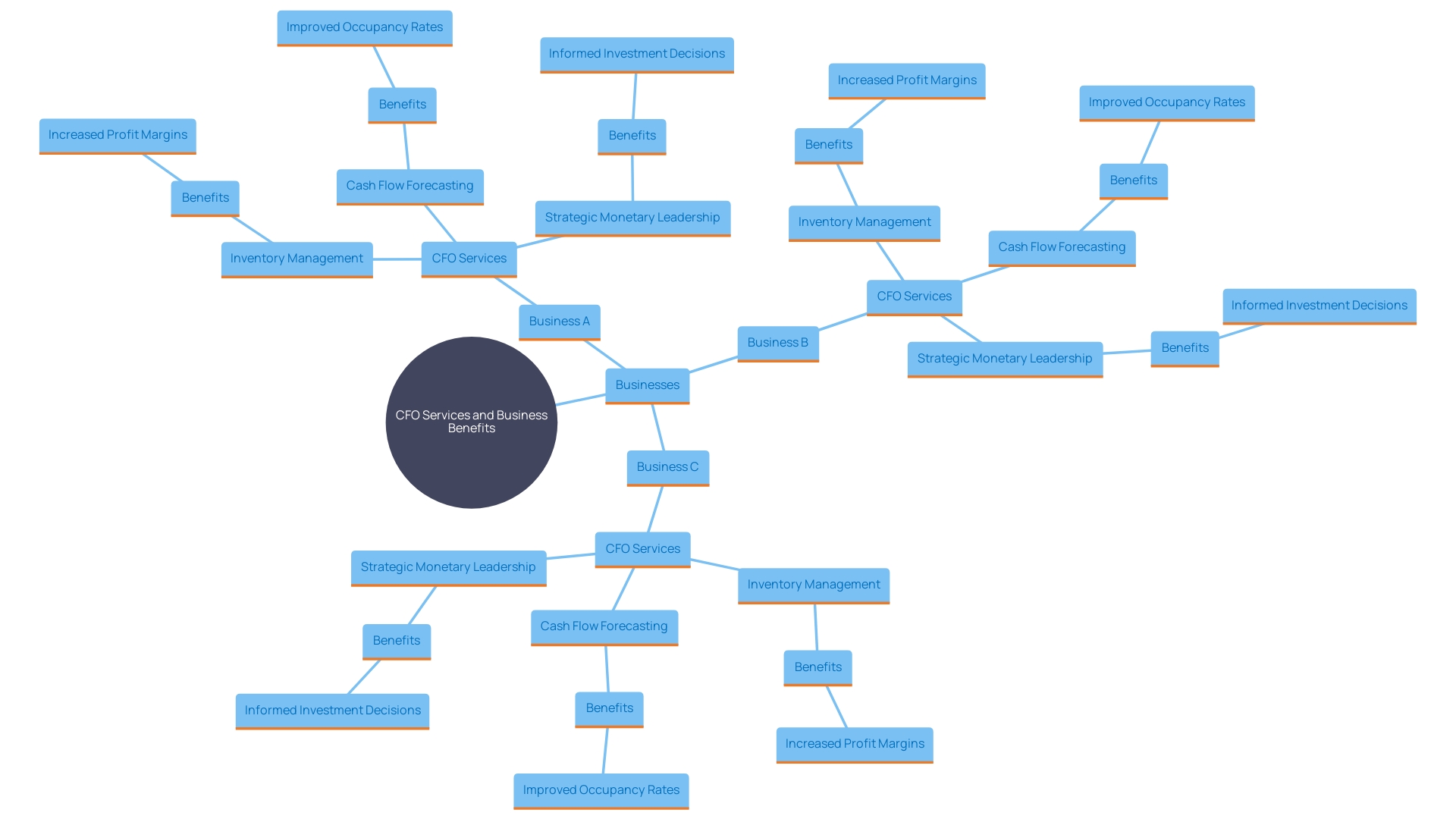
Conclusion
The Chief Financial Officer is vital in navigating the complexities of modern business. By developing robust financial strategies, CFOs ensure compliance, accurate reporting, and informed decision-making essential for sustainable growth. Statistics reveal the importance of strategic financial planning, particularly for startups, where a skilled CFO can mitigate risks and enhance business value.
Outsourcing CFO services allows organizations to access specialized expertise without the cost of a full-time executive, enabling them to focus on core operations while leveraging advanced financial tools. The integration of technology and automation further streamlines financial management, improving productivity and efficiency.
CFO advisory services provide critical support in areas like risk management, compliance, and data analysis. Collaborating with experienced CFO consultants helps organizations uncover growth opportunities and effectively navigate market challenges. Transformative case studies illustrate that CFOs are essential not just for maintaining financial records but also for driving overall business strategy.
In essence, the evolving role of the CFO is crucial for achieving financial stability and growth. By adopting a proactive and strategic approach, CFOs empower organizations to thrive in a competitive landscape, ensuring long-term success and resilience in the face of challenges.




